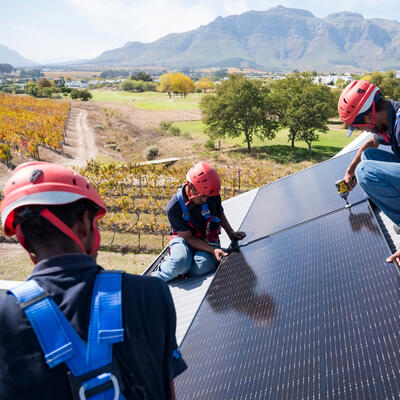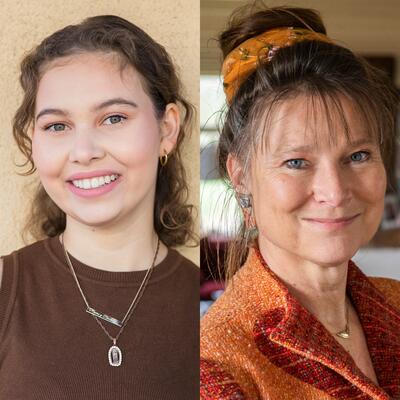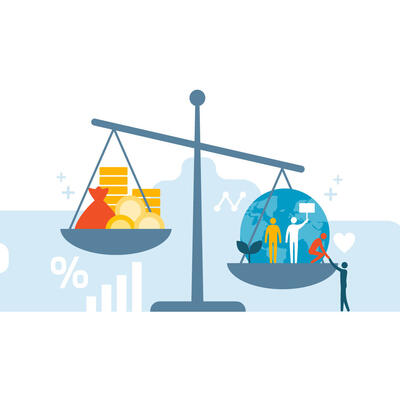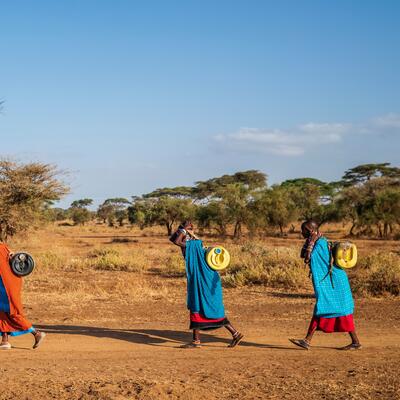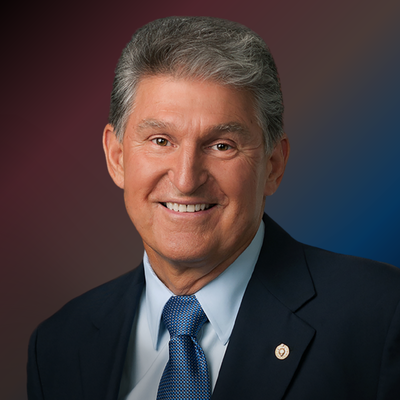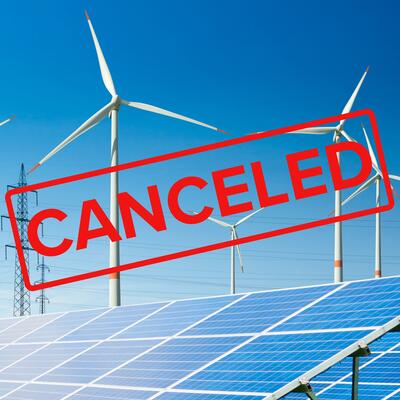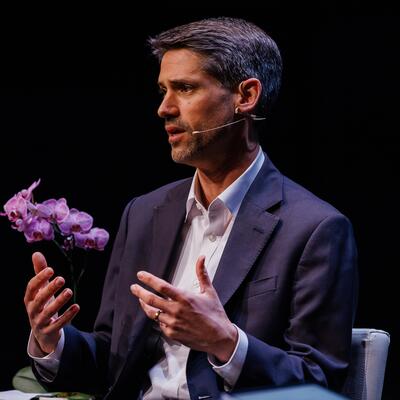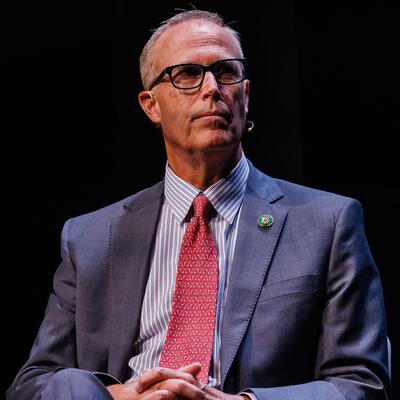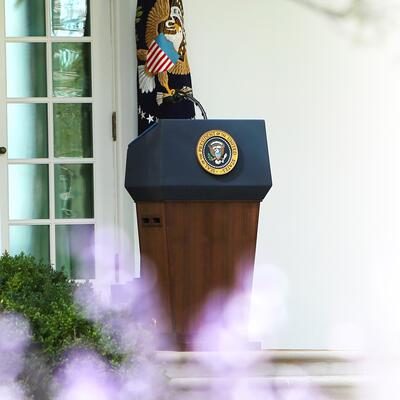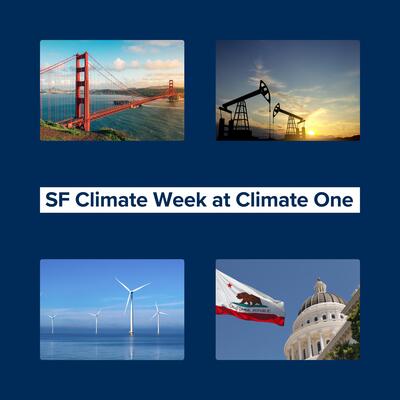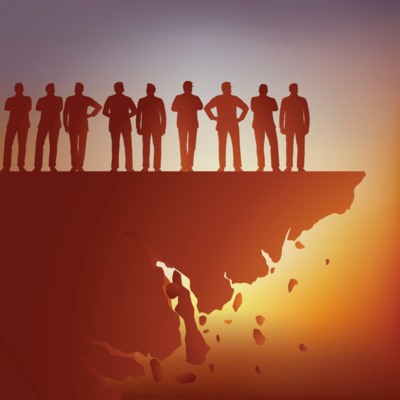
Rethinking Economic Growth, Wealth, and Health
Guests
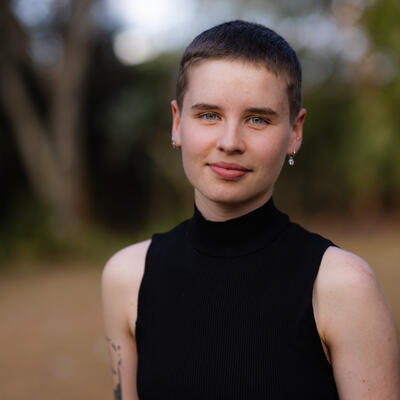
Anuna de Wever
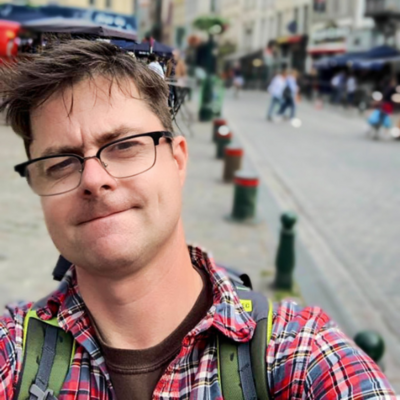
Leigh Phillips
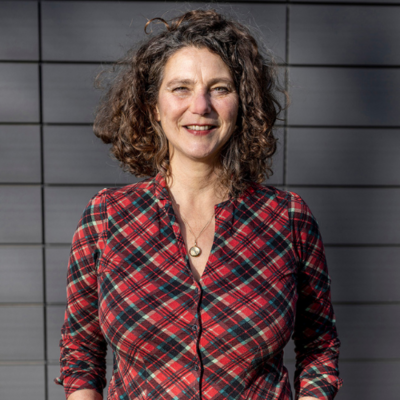
Marieke van Doorninck
Summary
Since the industrial revolution, the global north has seen massive economic growth. And today, many believe continued growth to be the engine of a healthy economy. Yet much of that growth has been linked to increasing greenhouse gas emissions. We also live on a planet with finite resources, so it's hard to believe that we can continue to consume resources and release emissions and not sail right past our collective climate goals.
That’s why some are looking to new economic ideas that don’t make growth the primary measure of a successful economy. Marieke van Doorninck, Director of Kennisland and former Deputy Mayor of Amsterdam, says, “We can't keep on growing. Our earth doesn't provide enough resources to keep on growing. And our social system doesn't have the foundation to keep on growing.”
Climate and social justice activist Anuna De Wever argues that selective degrowth of certain sectors of economies in wealthy countries would allow everyone to live within planetary boundaries. “Degrowth looks at the combination of feminist theory, Marxist theory, and obviously anti-capitalism, decolonization, [and] anti-racism.”
Leigh Phillips, journalist and author of Austerity Ecology & The Collapse-Porn Addicts, argues that degrowth would actually hurt the least privileged people in both rich and poor countries. “To give everybody in the world the standard of living of the average Dane would require economic growth of about five times the current size of the global economy.,” Phillips says. “The vast majority of greenhouse gas emissions come from vitally socially necessary activities such as heating, electricity, transportation, cement for the building of homes, schools, hospitals, and so on and so forth.”
Phillips shares the goal of reducing greenhouse gas emissions but believes that degrowth is the wrong approach. Instead, he favors decoupling growth from emissions, largely by swapping polluting technologies for clean technologies – such as swapping your methane gas stove for an electric induction cooktop.While it is true that around 30 countries have decoupled economic growth from emissions growth, overall global emissions are growing.
In 2012, economist Kate Raworth came up with the idea of what she called “The Doughnut Economy.” Raworth says, “I tried to draw a picture of the world that we want to live in and it, silly though it sounds, it came out looking like a doughnut American one with a hole in the middle.” The doughnut serves as a visual representation where the hole of the doughnut represents deprivation, where there is a shortfall of resources necessary for people to have a good life. The doughnut ring itself offers the range where society can live without breaching planetary boundaries, represented by anything beyond the doughnut.
Amsterdam was the first city to adopt aspects of Doughnut Economics into city policy. The first programs began during the COVID-19 pandemic. Marieke van Doorninck was the driving force behind adopting doughnut policies. She says, “People were looking for answers and knew that we couldn't find those answers in old economical models that had failed us already.”
When the Amsterdam city government noticed that there were people in the city who couldn’t access tablets or laptops, they created a program where instead of buying new laptops and tablets for those people, old laptops and other devices were collected and refurbished by people who were out of work. The program fulfilled the needs of those who needed electronic devices for work and school, and helped those who wanted work, all without producing any new products. That program is still in place.
Marieke van Doorninck says, “The idea about degrowth is really what's after growth. So that's why I like the term post-growth very much. It's about, so now that we have grown, what do we do? We can't keep on growing. We have to stabilize, we have to look for where do we go next? And you know, when people think that if we stop growing, we get recession. I think what we need to say is: after growth you get flowering. You get blossom. And I think we need to learn how to blossom.”
Episode Highlights
4:00 - Anuna De Wever on embracing Degrowth
5:57 - Leigh Phillips on his problems with capitalism
8:22 - Leigh Phillips on required growth to life living standards
12:25 - Anuna De Wever on why green growth is not the answer
16:34 - Leigh Phillips on the need for technology-switching
21:17 - Anuna De Wever on race and privilege and the climate crisis
24:14 - Anuna De Wever on the usefulness of the term degrowth
32:31 - Kate Raworth on Doughnut Economics
35:10 - Marieke van Doorninck on Amsterdam’s high sustainability standards
37:28 - Marieke van Doorninck on overconsumption and growth addiction
47:37 - Marieke van Doorninck on implementing doughnut policies during COVID
Resources From This Episode (5)
Full Transcript
Note: Transcripts are generated using a combination of automated software and human transcribers and may contain errors. Please check the actual audio before quoting it.
Greg Dalton: This is Climate One. I’m Greg Dalton.
Ariana Brocious: And I’m Ariana Brocious.
Greg Dalton: Since the industrial revolution, the global north has sustained economic growth unlike any other time in history.
Ariana Brocious: And today, many understand continued growth to be the engine of a healthy economy.
Greg Dalton: Almost everyone is for economic growth. That’s generally unquestioned. But by and large, economic growth has been tied to greenhouse gas emissions. AND we live on a planet with finite resources, That’s why we’re talking about growth today.
Ariana Brocious: Right, it’s hard to believe that we can continue to consume resources and release emissions and not sail right past our collective climate goal of limiting global temperature rise to prevent worsening climate impacts.
Greg Dalton: And, frankly, it’s hard to see how everyone on the planet could live the way the two of us do. I have a hard time seeing that add up.
Ariana Brocious: That’s why some people are starting to rethink perpetual economic growth and the structure of the economy.
Greg Dalton: There is a school of thought emerging in some circles called Post-Growth or Degrowth. One of its main ideas is finding ways to measure the health of an economy using metrics other than growth. Like a well-being index, for example.
Ariana Brocious: Which sounds a lot better than Gross Domestic Product. And, importantly, proponents of this approach are focused on how we can have equity and prosperity living within planetary boundaries – essentially the real and firm environmental limits within which humanity can safely exist.
Greg Dalton: And humanity depends on pollinators for producing food, forests for cleaning water, trees for cleaning air. We need services provided by nature to sustain all life on this planet, including our own.
Ariana Brocious: Recognizing that interdependence, some economists, academics, and activists are advocating a philosophy called degrowth – basically, a planned reduction in some economic areas to help conserve the environment and address the climate crisis.
Greg Dalton: Like any political discussions though, these words can mean a lot of different things to different people, and pinning down exactly what is being proposed can be difficult. To talk through these ideas, I had a conversation with climate and social justice activist, Anuna De Wever, who is an advocate for degrowth and decolonization.
Ariana Brocious: Joining the conversation is Leigh Phillips, journalist and author of Austerity Ecology & the Collapse-Porn Addicts. He’s a critic of the degrowth movement.
Greg Dalton: Anuna started the conversation by sharing her personal journey to embracing degrowth.
Anuna De Wever: I've been a climate activist for a very long time, and it actually started with me being a human rights activist, and after a while I started realizing that the climate crisis is the biggest human rights crisis of our century that we'll face. Maybe beyond if we don't actually get to solve it. And so for a very long time, also being a spokesperson of a movement, I've been in a lot of political debates with politicians, with journalists, with CEOs, with organizations, talking about the different solutions that we could use to actually battle the climate crisis. And none of them were systemic enough until I found Degrowth. And Degrowth looks at the combination of feminist theory, um, Marxist theory, uh, obviously anti capitalism. Decolonization, anti-racism. A lot of the theories that I actually subscribe to and a lot of the theories that I think about when I think about the system that actually got us into this. And so recently I've heard about it. I've been looking into it, I've been studying it, uh, and um, thinking and working around how to use that in my activism and how to actually strengthen the degrowth movement.
Greg Dalton: What makes you happy, Anuna, and does capitalism deliver that for you?
Anuna De Wever: No. It really doesn't, and that's actually one of the things that I also see apart from all of the harm that capitalism is bringing onto our world. Globally and in Europe, uh, capitalism also doesn't make me happy as an individual. The things that make me happy is the time that I get to spend with my family and friends and clean air, fresh water, a healthy planet, a secure future. And these are all things that are, uh, very insecure right now. And I am also a wide European climate activist. I am in a very privileged position when it comes to the climate crisis, so even understanding how the system is harming me versus the rest of the world, uh, my generation and the other, other activists that I'm working with. This is just a very, very necessary topic for us to talk about. So again, thank you for having me. I'm, I'm really excited to be delving into this.
Greg Dalton: Leigh, do the material things produced by our capitalist system make you happy?
Leigh Phillips: I would say that the problems with capitalism is not so much that it makes me happy or unhappy, it's that there's a set of things that are useful, which is larger than the set of things that is profitable. If there's something that is beneficial, But isn't, but isn't profitable there's no incentive in markets, to produce those things. And conversely, if there is something that is, that we know to be harmful, but is profitable, there continues to be an incentive for those, those goods or services to be produced.
Greg Dalton: Right. I had an investment banker say to me once, who's diabetic there's no financial incentive in curing diabetes because there's a profit incentive in selling him insulin every week and every day that he needs to put in his body. Right? Be another example. Do you think, Leigh, that you consume too much and do you ever feel bad about how much you consume?
Leigh Phillips: No, uh, my God. Um, I think that, um, it takes a level of extreme middle class privilege to think that, uh, Westerners, whether we're talking about Americans or Europeans, or Canadians, in my case, consume too much when 60% of Americans live paycheck to paycheck, that for the last 40 years, working class Americans, working class Europeans have suffered from nothing but austerity, uh, deindustrialization, stagnating wages in many sectors. If anything, I would like to see working class people earn a lot more, uh, to be able to consume a lot more. I want to be able for everybody to have a nice life.
Anuna De Wever: I wanna point out that we completely agree on that. I think only our conclusion is different. I think that it's very true that there's a lot of people in western societies and wealthy countries that are living paycheck to paycheck that are living in poverty, that are living in, uh, energy, poverty, and crisis and insecurity. And that, for me comes out of the conclusion that however much capitalism is producing and consuming all the time, it is still leaving so many people behind. And that's actually where I'm thinking oky, wae clearly need to look at the system very critically and actually understand who are we growing this economy for? What is laying underneath our economy and how do we change that? But understanding the problems that also people in the West have with capitalism. I very, very much do. However, on a global scale, the 1%, and I'm not a part of that 1%, but the 1% consumes, uh, 50% of everything. And that's, and that is also a result of, of capitalism because capitalism is built for wealth accommodation. So that is just an organic result of what happens if we continue to live in this economic system.
Leigh Phillips: Right. So to lift everybody up, to lift everybody up to a decent standard of living, let's say like a middle-class Dane, somebody from Denmark. You know, we often talk about Denmark, Sweden, Norway, Finland being like, um, both very egalitarian but highly prosperous society. So, so that's the service, society or level standard of living that I like to see everybody in the world have. For that to happen, Max Roser. Our World in Data, the sort of data visualization and statistics organization out of Oxford University made a calculation recently that to give everybody in the world the standard of living of the average the average Dane, would require economic growth of about five times the current size of the global economy. So even though I do think that you, I think you are absolutely sincere when you say that you would like to see working class people in Europe and North America to live a good life and not have austerity imposed on them anymore. But in order to achieve that, you have to have a lot more economic growth. Even if we redistributed the wealth of the 1%, it would not be sufficient to ever to lift everybody in the world up to a nice Danish middle class standard of living.
Anuna De Wever: First of all, there's a lot of research, right? Because, there's recent research actually published in Science Direct that flourishing lives globally, all around the world with 60% less of the resource use and 80% less of our energy use. So those are huge numbers in which we can actually look at what are we producing, what are we consuming? Why does it take so much energy and resources, and how can we slim that in our economy? And again, I think that thinking if you just have more growth and more growth and grow more growth like we're doing now, eventually we're gonna solve these issues like classism. No, I think classism is created through capitalism and that's where I find the analysis of thinking. We're just gonna continue to do what we do and hope that monopolies and, and the wealth will be redistributed. And even then, we need to grow our economy to redistribute even further on a global scale. First of all, there's a lot of science that contradicts that because we already have a lot of energy and wealth and resources that if we actually redistribute that and we have a democratic conversation about what we prioritize, we can live on a global scale with the things that we need and meet people's basic needs, and capitalism just provide that.
Leigh Phillips: No, we can't. Think about all the schools and hospitals, just those, just all the schools and hospitals we would have to build in the global south to deliver that level of access to them. How much cement we would be having to produce extra cement, uh, uh, producing how much extra electricity we would need, to power those, just those hospitals and schools. And to say, and to say that we, that we can do that without, that we can deliver all those services to people without an increase in, um, in economic growth is false. What is true is that we can become more efficient with our use of energy. We can be more efficient with our use of material resources. We can what's called decouple, economic growth from, from resource use. And what we found is, That, you know, there are about 30 countries that have completely, absolutely not relatively decoupled their emissions from their economic growth. And that's also true for a number of other sectors that we wanna be, we might be concerned with beyond climate change, there are a range of different sectors, uh, where there's been absolutely decoupling, continued economic growth in those sectors while the material and energetic use has, has, has plateaued or declined.
Greg Dalton: I'll admit that coming into this, coming into this interview, I thought that no country had decoupled economic growth from carbon emissions. That's the goal of economies to rise and emissions to decline. I'm chagrinned to say, when I looked into Our World in Data, many decoupled, most are industrialized economies in North America, Europe, also Estonia, Jordan, and some other emerging economy, so decoupling is happening on a country level. It has not yet happened on a global level, and Anuna, isn't that evidence that green growth is starting to work?
Anuna De Wever: Not at all. So the thing is, the question is not if we can decouple emissions from GDP growth. We know that we can, but we cannot do that with the timeline of carbon budget, planetary boundaries and feedback loops and scale that we needed to do, there is simply no empirical evidence that proves that we can, If you're saying that green growth really works absolute decoupling is working and green growth is working, our emissions are rising. We have crossed six out of nine planetary boundaries. The IPCC report said that in less than five years from now, we're gonna cross our 1.5 degree threshold. And what we are seeing is that the renewable energies that we are generating to actually compensate for the energy that we need to grow our economy are just not coming fast enough since we are growing this economy. So we continuously need more energy and resources and in that we're also, we, we keep talking about energy, but we also need to talk about resources. We do live in an economy that is built on white supremacy and a lot of the trade and investment agreements, a lot of the trade and investment agreements that we have, especially in Europe, still have very big colonial dynamics built into them regarding raw materials. So when you're talking about growing our economy, do you also understand how much resources and raw materials that needs and where we're gonna get that from?
Leigh Phillips: And I would suggest that the working class people in those countries, might want economic development and that in, so take for example, Canada and Australia, these are two, um, developed countries where they, you we still have a very, very large part of our economy devoted to mining. Now thanks to decades of trade union struggle of indigenous struggle of, in fact environmental struggle in these two countries, there are very strong, labor protections. There are good health and safety standards, there are good wages. For example, in northern Saskatchewan,which is where most of North America gets its uranium for, for nuclear power from, most of the workers. In those mines are indigenous. Those, they are, uh, they're very good, paying jobs. They're community supporting, their family, supporting those first nations, those indigenous people are not calling for an end to mines. In fact, if, uh, they put out, they regularly put out statements saying that they're concerned about the closure of nuclear power plants in the United States organized by people like the deep, you know, deep growth community and other environmentalists, because it would result in a loss of jobs. Progressive governments in Latin America are in favor of, extraction. But what they want is extraction. Where there are strong trade union protections, there are strong health and safety standards, and there are strong environmental standards. Once we have that, then there's nothing wrong with extraction whatsoever
Greg Dalton: You’re listening to a Climate One conversation about a post-growth economy. Our podcasts typically contain extra content beyond what’s heard on the radio. If you missed a previous episode, or want to hear more of Climate One’s empowering conversations, subscribe to our podcast wherever you get your pods.
Please help us get people talking more about climate by giving us a rating or review. You can do it right now on your device. You can also help by sending a link to this episode to a friend. On our new website you can create and share playlists focused on topics including food, energy, EVs, activism.
Coming up, what could degrowth mean for the global south?
Anuna De Wever: This means degrowth in wealthy nations that are currently extracting and exploiting developing nations so that we can grow the economies and develop the economies on a local and community level in countries in the global south that have for long suffered from these colonial legacies.
Greg Dalton: That’s up next, when Climate One continues.
Let’s get back to my conversation with Anuna Der Wever and Leigh Phillips. Techno-switching is the idea that we can swap one technology for another to reduce emissions. Swapping your methane gas stove for an electric induction cooktop, for example. Those kinds of changes are powerful and necessary.
Ariana Brocious: But some techno-optimists make it sound like techno-switching is all we need to do. And that avoids harder changes in our personal behavior as well as our culture and economy that others think are necessary.
Greg Dalton: Leigh Phillips says techno-switching will be required of us.
Leigh Phillips: The vast majority of, greenhouse gas emissions come from vitally socially necessary, activities such as heating, electricity, transportation, cement for the building of homes, schools, hospitals, and so on and so forth. So we have no choice but to technology switch. The question is instead is how, how does capitalism or how do markets. potentially delay or inhibit that technology switching. And as I said earlier, if there is something that is profitable, and that is a benefit to us, then there's an incentive for that to happen. And so in some cases that is happening already. The problem comes when we have technologies that, that maybe not be ready for prime time yet, that where there are lab bench or startup or a certain research level or even, and that needs to be taken through, the Valley of Death through to competitive commercialization for that to happen, we can't depend on market business as usual. And what we have to have is some sort of state intervention, in the form of things like regulation or industrial policy, there are many different types of industrial policy or even public ownership, to be able to cover that gap with that, that to de-risk,the development of those technologies and move them through to, to, competitive commercialization. And the problem that we have had historically is that we've only, and why we have been so delayed in this is twofold. One is that we primarily focused on things like, small tweaks to markets such as carbon pricing rather than much more robust intervention in the economy in the form of things like industrial policy. And I would say that the Inflation Reduction Act in the United States is a sea change. In how we approach this, where there is now government incentives to develop these technologies, recognizing that markets left to their own devices will not solve the problem. So in many respects, that's a sort of socialist shift.
Greg Dalton: Anuna, your view on technology switching and industrial policy.
Anuna De Wever: I think technology switching technology development, Renewable energies, all of those technology, technological solutions we are going to need. What is my problem is that it seems to be the only thing that people constantly refer to that and decoupling on why we can just continue to do what we're doing and it's not gonna be an issue. And every single time, again, I'm looking at emissions rising. I'm looking at planetary boundaries, carbon budget feedback groups, IPCC reports. It's not getting any better. And also, I c authors are saying that the technology that we will need to reduce the emissions as radically as they need to be reduced, does not exist.We had a, I’m at a degrowth conference right now actually, and there was a keynote yesterday, from Diana Uge, who is an vice president of IPCC right now. And she was saying that by 2050 in the most optimistic economic growth scenarios. The vast majority of the world's population won't even have a refrigerator, let alone us developing these kinds of technologies that are gonna do the amount of carbon capture that you imagine. So my issue is just that I feel like we are constantly going back to these solutions to avoid looking at the system that is actually causing it, and the system is intersectional. The system is big, the system is historical. I am a 22 year old activist and I'm trying to understand how all of this is fitting together. It's a huge thing. But what I am seeing is that my generation is willing to actually have the conversation to actually dream about a different alternative reality. And we have been promised so many things for such a long time and it's simply not working. So we are looking at different alternative economic systems because at the end of the day, it is about our economic system that does need to change.
Greg Dalton: And Leigh, we talk about an energy transition and reality is we've grown a lot of renewables, wind, solar, electric vehicles, but it's really been an energy addition. Those new technologies are fueling new demand. They're not displacing fossil fuels. EV adoption is not denting oil demand. So while we're deploying lots of renewables, that's really just feeding growth. It's not displacing fossil fuels in a way we need to reduce emissions. Would you agree with that, Leigh?
Leigh Phillips: I would say that I think you're looking at things too much at a global level and at a global level it is true that emissions, and fossil fuel use are continuing to grow. But I would suggest that we return to the point that I made earlier about, there's 30 countries that have, or roughly 30 countries that have absolutely decoupled. Let's remember it was only last year that the Inflation Reduction Act was passed. It's been one year. The European Union, for example, continues to overwhelmingly depend upon market mechanisms, its emissions trading scheme to drive through, emissions decoupling, decarbonization. And I would suggest that, the more that we push for industrial policy, the faster the decarbonization will happen.
Greg Dalton: How do race and privilege play into the way you believe we should address the climate crisis?
Anuna De Wever: I think that's where democratization comes in, and that's also a part of Degrowth. That's also part of socialism is that you look at who can actually be a part of this political debate and how can we make sure everybody has access to that? Degrowth is about selective degrowth, so this means degrowth in wealthy nations that are currently extracting and exploiting developing nations so that we can grow the economies and develop the economies on a local and community level in countries in the global south that have for long suffered from these colonial legacies. And on top of that, there's also a lot of people that are just excluded from that debate, entirely. I'm working a lot on the, in my main campaign, and it's a campaign for the regularization of undocumented, people. So people that are not even recognized as human beings in a country and they're completely excluded from a debate that is actually very harmful to them because they are obviously, very much touched by the consequences of the climate crisis. So for me, democratization in that is, is extremely important and I have a lot of access to political debates. Obviously, I'm literally sitting here with you having this debate on a big podcast, so I am hoping that there's gonna be many more people around the world that deserve this platform to have this platform.
Greg Dalton: And now Leigh, how about your view of how race and privilege play into the way you believe we should address the climate crisis?
Leigh Phillips: I think there’s a soft racism within a section of the climate left, within the Degrowth community that, uh, assumes that people in the developing world, in the global south do not want to develop, that they, um, that that extraction can only be performed in ways that are, uh, colonial. It ignores what people in those, the majority of people in those, uh, those regions and in those countries are actually saying, uh, what they want. And that doesn't just go for people in the developing world, but also people of color and indigenous people in the developed world as well. That, uh, what we want, uh, what they want, which I think everybody wants, is good jobs that, uh, support their communities, that support their families that are intergenerational and sustainable with health andgood health and safety protections. And so I would say that the best avenue for a. A reckoning with, questions of race and privilege and, and disparities, inequality is through the trade union movement that I would love for the trade union movement to take, over the climate discourse and steer. the discourse towards the sort of industrial policy and technology switching and economic planning that I've been talking about.
Greg Dalton: We've been talking about Degrowth and certainly in the United States, defund the police is a political kiss of death. And degrowth. It has the same kind of branding problem for me that like, people stop listening. So is Degrowth, post growth, are they the same thing to you? Would you agree that de growth degrowth is a terrible term.
Anuna De Wever: As for the word degrowth, I think that where it came from is that there's been a lot of economic, new economic ideas. For example, the wellbeing economy, the care economy, circular economy, donor economy, that in some way or another have been co-opted by capitalism and have not been controversial enough for people to actually start debating it in a systemic way. And I think the intention there was that degrowth would be controversial, not co-opted by capitalism for people to actually have that debate. And I do think we succeeded in that. But the question remains, does this need to be the term of the movement, the way that we're gonna have these conversations? I don't know. I'm not very attached to it emotionally, to be honest. I think Degrowth is many things. As I said in the beginning, I think it integrates a lot of the systems thinking that I've been doing, and the word degrowth doesn't necessarily refer to that. So when it comes to actually having these conversations with movements, And by the way, I'm doing that because I'm part of grassroots movements also with a lot of indigenous movements and communities in the global south. These words are not necessarily centered in the conversation because it's just more about what does it actually mean for us and how are we gonna get there?
Greg Dalton: Anuna, you say people are stuck in a productivity trap. What is that and what's an example of being stuck in a productivity trap?
Anuna De Wever: What I mean with that is that our capitalist system requires us to grow our economy all the time. So we need to have labor that is productive. So people are constantly working and working. And we know this 'cause we call this the rat race, right? And also in my generation, I see that there is just so many people going into burnout and I must admit, the climate movement isn't great at that either, 'cause we also have a lot of people in burnout because we are obviously countering the systems. We're also working way too hard. But I think that this is a part of the conversation in Degrowth. If you stop being obsessed with the fact that we need to grow G D P all the time and you reprioritize what does it, what do we actually need in this economy? What does actually make people happy? What does basic human needs actually mean on a global scale? Then you can also lower the labor hours and people don't have to work all the time to continue raising GDP. So for me, that's one of the, one of the most fundamental things. 'cause I feel like, and I see that in my circles, but we just know that from statistics, a lot of people are stuck in unfulfilling jobs. A lot of people are unhappy in the work that they're doing and the labor that they have to do every day to live from paycheck to paycheck. And this is something that also systemically and drastically and fundamentally needs to change. At the same time, I think that Leigh might also agree on that analysis, but not necessarily then on the conclusion.
Greg Dalton: Leigh, your response.
Leigh Phillips: I would say that I, I'd a four day work week. I think that's a great idea, so long as there's no loss in pay. but, I just don't see how we're going to build out all of the huge amount of clean energy infrastructure. I mean it's, the estimates are between, a doubling and a quadrupling of the current energy infrastructure enabled to electrify. Everything needs to be electrified and. And the other sort of,processes of decarbonization beyond electrification. So if anything, there's going to be a lot more work that needs to be done, over the next 20, 30, 40 years, to build out all that infrastructure. it needs to be done in an egalitarian fashion. I want to see less burnout for sure. I want to see a shorter work week and higher pay. But again, if you do all that, if you shorten the work week to four days a week without any loss in pay, that would put a lot more money in working class people's pockets. So they would spend a lot more money on many more things. Surely that's economic growth that would result in economic growth. Certainly the build out of all the, the infrastructure that, I was just talking about. Will also require, and is probably the, biggest burst of economic growth in human history to, to build all that stuff, that infrastructure out in the next 20 to 30 years. And then finally, I would just say that,in response to the argument that capitalism requires growth, socialism requires growth as well. To build, again, to build out all the public schools, the public, hospitals, the public clinics, the public energy systems, the public,railroads and so on and so forth. All of those non-capitalist,bits of infrastructure, need to grow as well if we're going to deliver,decent standard of living to everybody. So socialism also requires economic growth. Certainly the climate transition requires an enormous amount of economic growth.
Anuna De Wever: This is about shifting, right? We have so many people and so much, resources and energy and labor going into corporations like Amazon, Apple, Shine, Coca-Cola, and that is not, those are not the things that are making people happy. So it's about shifting that labor, shifting those energies, shifting those resources, and again, reprioritizing what do we actually need? For example, the fast fashion industry, we have six times the amount we have enough clothes right now to close six generations of human beings, and we keep producing and producing more. We keep using resources, energy, labor, to do that for things that nobody needs, and that is what degrowth is about. It's having a conversation about what is a priority here. All of the resources, all of the energies, all of these things that are also, again, crossing all of these sanitary boundaries, we are not even able to provide people with basic human needs.
Greg Dalton: Leigh, what about GDP as the sole measure of human progress and prosperity and what might replace GDP?
Leigh Phillips: Well, I'm a socialist, so I have no particular attachment to that particular metric. I think there's lots of other metrics we could use, but, the question isn't so much. The metric is whether we need a open-ended, bounded unbounded, economic growth to steadily allow for human progress.
Greg Dalton: Do you believe there are planetary boundaries that, people say that, we just can't hammer and extract from the earth? 8 billion people living like the three of us frankly, doesn't work.
Leigh Phillips: I've said before that, we've seen in a number of sectors, in a number of countries that we've achieved absolute decoupling. So yes, you can. We've already proven that. we can, we can continue to expand the standard of living of people while absolutely decoupling their resource use of course once energetic, Which energy use is decarbonized, and it doesn't really matter how much we expand it by.
Greg Dalton: We focused on the disagreements, but I actually think you agree, quite a bit. Climate's a real problem. We need fundamental change in the economy. Anuna, what do you hear from Leigh that you agree with?
Anuna De Wever: I agree with the fact that you're saying that you do feel there needs to be a systemic social and political change. And I don't hear that a lot in the conversation that I'm having about Degrowth, so I appreciate you saying that, and I think that's true. Also because you're a socialist, obviously, you're not a diehard capitalist, I can see that. And I think that's also where we agree, where we do need to redistribute and we do need to invest in the commons. And we do need to make sure that everybody globally, any western societies have access to human basic needs. We just disagree on how to get there. But I think the intention is the same.
Greg Dalton: And Leigh, what have you heard from Anuna that you agree with?
Leigh Phillips: Yeah, I would reflect that back to her. She's very clearly an egalitarian, a socialist, very concerned about racism and colonialism. These are all my pet issues as well that she believes in,the scientific evidence for anthropogenic global warming. there's so much that we do agree on. But I do, I also agree with her, on her diagnosis that, we just disagree on the path, out of that problem.
Greg Dalton: Lee Phillips and an Anuna De Wever. Thank you so much for sharing your passionate ideas and differences here on Climate One.
Anuna De Wever: Thank you.
Greg Dalton: In 2012 economist Kate Raworth came up with an theory called Doughnut Economics, which is another variation of a post-growth philosophy.
Ariana Brocious: It sounds delicious, but it has nothing to do with fried dough. That’s just a helpful image to think through this approach. Let’s hear Raworth explain Doughnut Economics. This audio is courtesy of Ross Harrison.
Kate Raworth: I tried to draw a picture of the world that we want to live in and it, silly though, it sounds, it came out looking like a donut American one with a hole in the middle. So imagine a donut. There's the outside and then there's the inside and there's that hole in the middle. In the hole in the middle. That's a space of deprivation, a space of shortfall where people don't have the resources to meet the essentials of life. Like they don't have enough food or education. They don't have access to electricity, enough income, they don't have decent housing. So it's a space of shortfall and we want to get people outta that hole in the middle, into the donut, but we want to do that for the whole world, making sure that we also don't go beyond the donuts out crust because that's a space of ecological overshoot where humanity puts more pressure on the planet than the planet can take. And we start causing climate change or massive loss of biodiversity. We start creating a hole in the ozone layer or polluting earth with chemicals that we add to it. So we need to both get people out of deprivation and poverty. Also protect earth but also protect these fundamental life supporting systems that keep us alive. Those are the two sides of human wellbeing. The inside and the outside. The donut. And the 21st century challenge is a unique one. It's to get everybody outta poverty while coming back in at the same time. That's never been taken on before and that's partly why we need to rewrite economics, 'cause it's a completely new way of looking at what human wellbeing is.
Ariana Brocious: Raworth has since started the Doughnut Economics Action Lab to help implement her ideas in cities, countries and businesses around the world.
Greg Dalton: And the first place to implement some of those principles was the city of Amsterdam.
Ariana Brocious: After the break, we’ll hear from Marieke Van Doorninck, who was deputy mayor of Amsterdam and the driving force behind the city’s adoption of doughnut economics, on what it was like to bring new ideas to city policy.
Marieke Van Doorninck: It's about so many other things than about consuming and about, getting money. So I think it really helped people to think about that we need new solutions for the problems that we're dealing with
Ariana Brocious: That’s up next
Greg Dalton: It’s one thing to talk about ideas that could be implemented. It’s another to actually try and implement them. Amsterdam was the first city to adopt Doughnut Economics into city policy. And they started during the COVID-19 pandemic.
Ariana Brocious: I talked with Marieke Van Doorninck, who was deputy mayor for the City of Amsterdam when the doughnut policies were adopted. She says it began with Amsterdam’s high sustainability goal.
Marieke Van Doorninck: Amsterdam had high ambitions on emissions when I started in 2018, it was said that we had to reduce 55 percent of our CO2 emissions So there was a big ambition. So when I was looking at the options, I had to do that. Most of the options, very, very technical. Uh, so actually what you do is you. You replace one fuel for the other, for a fossil fuel, and you make it into a biofuel or a synthetic fuel. Um, you're looking at cars. You go from an a, a motor car to a, an electric car. And actually just by changing one fuel system to the other actually doesn't solve all the problems. And, one of the problems that you could extra have is that all these solutions were quite expensive. so those who can afford to live sustainable could do that. They could buy an electric car, they could have the solar panels on their roof, but, uh, a lot people couldn't. And you create some kind of eco-elite, where the problems of inequality, which is also a big crisis in in many countries in the world, and, and Amsterdam has no exceptions, wouldn't be solved by that. And at the same time also this kind of what we call green growth, where actually we keep on growing and we keep the same economy that we have. We just do it in a green way. It uses a lot of natural resources like cobalt and lithium. And we also know that we also run out of these resources. So the ecological crisis that we have, that, you know, the damage done by all this mining of these minerals would actually not get better, but would get worse throughonly looking at, , getting sustainability by all these, uh, new techniques. So we knew we had to look for, uh, for something else, and that was really in the way that we produce and that we consume. Our economy is based on growth. If our economy doesn't grow, we're immediately in a recession. and, and that makes that we're keep on producing and producing and, and things are made to be broken. Things are made to grow out of efficient very fast so that we can buy new stuff to keep the economy growing. And if, if we are honest to each other, that. This system that this indefinite growth on a finite Earth is just no longer sustainable because it takes too much of our planet and it takes too much of our people, like thousands and millions of people who live on a very bad labor conditions because of this, this overconsumption, this addiction, uh, to growth. But for a long time we all were told that there is no alternative. This is the only economic model. So when I read about Kate Raworth donut economies, I really thought there is an alternative. There is another economic model that we can actually use, where we can fight the two crises that we're facing, the, the crisis of inequality that is growing and the crisis of climate and the crisis of biodiversity loss and the crisis of the ecological disasters that we're having. So for me, it was really looking at the problem, not from one side, just the sustainability, but really from the, both the social and the ecological side.
Ariana Brocious: So you've touched on this idea of slowing growth or reconsidering the perpetual growth that we've seen the world over in terms of the economy, and that's the focus of this episode, this idea of post growth. , one part of that concept is degrowth, which is kind of as you touched on this idea that wealthy countries cannot continue to have unlimited GDP growth. What do you think about the concept of Degrowth?
Marieke Van Doorninck: I think that we need to go towards a direction of degrowth because we can't keep on growing. Our earth doesn't provide enough resources, to keep on growing and, and our social system doesn't have, the foundation to, to, to keep on growing. And actually we don't need to keep on growing. We have in, in the western world, we have enough wealth, to live the way we do. We need to distribute our wealth in a better way. And actually the things that are, are not growing at the moment are the most important. It's our health, it's our wellbeing, it's our community life. Those are the things that are actually left behind in this, in this idea of economical growth. So the idea of degrowth is not about recession. The idea about degrowth is really what's after growth. So that's why I like the term post growth very much. It's about, so now that we have grown, what do we do? We can't keep on growing. We have to stabilize, we have to look for where do we go next? And you know, when people think that if we stop growing, we get recession. I think what we need to say is, after growth you get flowering. You get blossom. And I think we need to learn how to blossom.
Ariana Brocious: Yes. Lovely picture there. So how did donut economic principles end up being adopted in Amsterdam?
Marieke Van Doorninck: We connected it to the circular strategy of Amsterdam, so very much on circular economies, which is not as, um, let's say revolutionary as, as donut economies, but something that, that most cities are working on when it comes to sustainability. So we linked the two and said, we want to do something extra, because if I had wanted to, you know, to have the donut in all aspects of the city, I think I would still be talking to a lot of people and, they, they would be scared to go that far. So we decided just to start with those issues that we have most influence on and see if we can start there. So what we did was looking at three main issues, where's huge amount of materials going on, and actually materials where Amsterdam had also a say over. So we were looking, uh, at the, at the three, um, aspects on construction, on food and consumer goods. So we were really looking at what is our impact right now in those issues and how can we change that? For example, Amsterdam needs to build a lot of houses because we do have a housing crisis here. But we know that construction is extremely polluting. So now that we're, we're constructing houses and we try to use as much wood and other natural materials, uh, as possible. So we put that in the demands of those who are building in Amsterdam, that there's a really high level of demands when it comes to sustainability and not only in the uses of energy, but also in the materials that are being used in the building. And at the same time, we ask builders to, uh, to make a passport of the house. So if there comes a time when things need to be repaired, you know, you can easily repair that house, or even when it needs to be deconstructed, you can take everything apart and then use it for a new building.
Ariana Brocious: That's remarkable. Honestly, that's a really exciting concept. So I just wanna clarify, are these things that are actually in policy in law, in some form that are requirements of builders or are they recommendations?
Marieke Van Doorninck: Uh, some of them are requirements. Many of them are requirements and some of them are, uh, recommendations. But in, in the way we build in Amsterdam, we do it in, uh, we do it with tenders. Soyou get a lot of points if you do it in a circular way. So a lot of the builders want to do that. So it is both on the materials used, but also on what we call nature inclusive. So to make sure that, for example, birds can nest in housing. The surroundings around the urban areas are still places where also animals can live or also places where important, fauna can, flora can be there. So it's really about adding something to nature instead of doing it, instead of the nature that is already, uh, that is already there, or even places where there is no nature at this moment. For example, an old industrial area, which is then being transformed into a neighborhood. We add a huge amounts of green to enhance biodiversity in those, uh, in those areas. The other thing that I really like is that we also have what we call a material bank. So if, if there's places where houses or other buildings are being deconstructed, , there's a register where you have to say where the windows go and where the doors go. So actually, if somebody is building, they can actually look at, um, what is in the register and what can I reuse again so that I don't have to get new materials.
Ariana Brocious: That's really interesting. There are some small scale models of that I can think of in the US like the organization, Habitat for Humanity, which will acquire donated materials and, and sell them at a discount to people who are looking, but it's not as formalized as what you're describing. So that's a positive example. Can you help us understand where implementation of this has been the most difficult.
Marieke Van Doorninck: Well, there's a few things that makes it difficult and, and one of them is the way that a government organization is being set up and it's very sectoral. So it's really, you have the social sector, you have the environment sector, you have the building sector, and the donut, of course, is a very holistic model. It really tries to get all these different elements that are, that are causing the crisis in, in the world to put them together, to address all of them. And, um, so within policies, it's quite difficult to put them all together. Uh, and actually also sometimes the benefits from a policy don't lands, let's say are don't, are, are not very much seen in the sector that is paying the most, most of the prices for, you know, the, the advantages because the benefit is maybe more social or ecological than on the departments within the city that's actually building the houses. So we, we really have to also have a more let's say holistic or integrated way of governing the city, to really implement a good donut, to do it in a holistic way. What I like about the donut is really, you can start right away. We have so many examples in Amsterdam where actually it's not the government, but it's just communities, small businesses, enterprises that are doing donut deals that are actually putting those ecological boundaries and those social foundations together and start up something. But if you really want to do it thoroughly and, and, and get into the donut, you would also need some more systematic changes. And I think one of the most important is our tax system. Right now, the taxes on labor are pretty high. Taxas on, on primary resources, like, you know, newly mined materials are still far too low to really compensate for all the damage that new materials or raw, raw resources are doing. So we need a big shift from labor to consumption or to using raw materials. And this is something that the city of Amsterdam can't do. This is something that we need to do on a. On a national level or even at an EU level.
Ariana Brocious: Could you provide one quick example of what a community has done on their own?
Marieke Van Doorninck: One of the examples that we have is, that's a community in, in the southeast parts of Amsterdam and the Southeast is a rather poor and, and, uh, challenged neighborhood of Amsterdam. And there's a community they set we need to. get a sustainable heating system for our houses, because right now everything is on natural gas. but we don't want to be dependent and, and pay for a very expensive model. So what we want to do is we want to build our own digester system from old food, but also from the gutter. And to see if we can build this ourselves. And it's, it's, it's a huge plan. And they started step by step. So they now have a big food digester where also some of the, um, uh, small restaurants in the neighborhood and the shops in the neighborhood are distributing their old waste food and other waste products. They already are producing some gas right now. It's, it's quite difficult, but they're doing it. so actually the idea is, is people have something together, a little enterprise together for which they, uh, have their own cheap energy for their neighborhoods. But of course it takes a long time and there's more problems in the neighborhood. So they started by, , Also looking at the houses and say, uh, those are very bad insulated. So they bought some sewing machines and gave some sewing lessons to some of the people who were unemployed in the neighborhood. So people started sewing curtains for the neighborhood. And that was a good insulation. And at the same time, people would have an income by sewing those curtains. So it's, it's really small things, but it's, it's both increasing a community in a neighborhood where people are helping each other. It creates small jobs and it creates a sustainable way of heating, uh, heating the houses.
Ariana Brocious: That's really great. That's a lovely example. What role did the Covid crisis play in the adoption of donut economics?
Marieke Van Doorninck: Well, actually, when we were designing it, we were, we were looking forward to the launch and forward to all the discussions we would have about that. And, just a few weeks before the launch, COVID crisis hit the city and hit the World, and, uh, we were really discussing whether we should launch it because nobody was thinking about economics. People were thinking about their health. People were thinking about their, their businesses, afraid to, to go out of business because everything was closed down in, in, in the lockdown. So there was no room you would think of talking about donors, economics. And, um, in the end we decided to do it.
So I had an interview with Kate Raworth, a double interview in the Guardian and it immediately went wild. And I think it was because of the covid crisis that people, in such a crisis where, When you, when you are, you know, back to what is the most important to you and it's about health and it's about your social context, people you couldn't see anymore. It's about so many other things than about consuming and about getting money. So I think it really. It really helped people to think about that we need new solutions for the problems that we're dealing with. So actually it became maybe much bigger because of the crisis, because people were looking for answers and knew that we couldn't find those answer in old economical models that had failed us already. And at the same time we had some of the donuts projects that we did were actually invented in, in, in Covid times. Uh, we noticed quite soon that everybody was dependent, of course, on a laptop or on an iPad or some of devices where you could communicate in order to go to school or another to, to other things. And we noticed that a lot of people due to financial problems, didn't have, uh, these means of communication. So what we did was to collect old laptops from the city and we had them refurbished by people who, who didn't have a job and who, uh, had some kind of distance to the labor market. And then we distributed them amongst those people who had financial problems and were in isolation. And actually, it's a program that is still running.
Ariana Brocious: What's been the most important realization you've had since the adoption of the donut model in Amsterdam?
Marieke Van Doorninck: I think if you really want to change things, start doing it. And maybe not wait for the perfect moment, but really collect a group of people who are willing and who are ready to change and start, start changing things and, and make sure that actually, communities, people who who want to make those changes need to be supported because I think change in the end comes from the people doing it and not by government telling people to change.
Ariana Brocious: Marieke Van Doorninck is former Deputy Mayor for the City of Amsterdam and director of Kennisland. Thank you so much for joining us on Climate One.
Marieke Van Doorninck: It was my pleasure.
Greg Dalton: On this Climate One... We’ve been talking about rethinking approaches to economic growth.
Climate One’s empowering conversations connect all aspects of the climate emergency. To hear more, subscribe wherever you get your pods. Talking about climate can be hard-- AND it’s critical to address the transitions we need to make in all parts of society. Please help us get people talking more about climate by giving us a rating or review. You can do it right now on your device. You can also help by sending a link to this episode to a friend. On our new website you can create and share playlists focused on topics including food, energy, EVs, activism. By sharing you can help people have their own deeper climate conversations.
Brad Marshland is our senior producer; Our managing director is Jenny Park. Ariana Brocious is co-host, editor and producer. Austin Colón is producer and editor. Megan Biscieglia is our production manager. Wency Shaida is our development manager, Ben Testani is our communications manager. Our theme music was composed by George Young (and arranged by Matt Willcox). Gloria Duffy is CEO of The Commonwealth Club of California, the nonprofit and nonpartisan forum where our program originates. I’m Greg Dalton.
